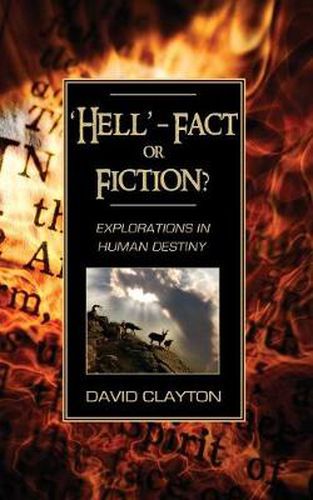Readings Newsletter
Become a Readings Member to make your shopping experience even easier.
Sign in or sign up for free!
You’re not far away from qualifying for FREE standard shipping within Australia
You’ve qualified for FREE standard shipping within Australia
The cart is loading…






This title is printed to order. This book may have been self-published. If so, we cannot guarantee the quality of the content. In the main most books will have gone through the editing process however some may not. We therefore suggest that you be aware of this before ordering this book. If in doubt check either the author or publisher’s details as we are unable to accept any returns unless they are faulty. Please contact us if you have any questions.
Soon as from earth I go what will become of me? Eternal happiness or woe must then my portion be.
Charles Wesley’s words from his moving hymn, ‘Idumea’, seem to encapsulate the traditional Evangelical standpoint on the afterlife. And it is in response to such a conservative ‘sheep and goats’ eschatology, as found in the Evangelical Alliance’s ‘Report on the Nature of Hell’ (2000), that the Reverend David Clayton has penned this sensitive yet carefully argued work.
From a pastoral point of view, preaching ‘hell’ today is a thankless task. Punishment is an alien concept to a whole generation. Criminals are simply ‘unlucky to get caught’. So the concepts of moral obloqy and enduring punishment are alien to our modern liberal minds.
David Clayton’s approach is theological and scripture-based. Careful analysis of key terms - ‘condemnation’, ‘judgment’, ‘eternity’ and ‘hell’ itself - reveals a convincing counter-argument to the traditionalists. Positing an intermediate state after death, he uses sources as diverse as Dean Farrar and Jan Bonda to offer hope of a ‘second chance’ to those who have lost sight of God’s kingdom, or who have never glimpsed it, here on earth.
Yes, we were ‘born to die’ in Wesley’s words. No, we were not fashioned in God’s likeness in order to suffer eternally. And the proof is found in the message of love preached by His son, Jesus Christ.
$9.00 standard shipping within Australia
FREE standard shipping within Australia for orders over $100.00
Express & International shipping calculated at checkout
This title is printed to order. This book may have been self-published. If so, we cannot guarantee the quality of the content. In the main most books will have gone through the editing process however some may not. We therefore suggest that you be aware of this before ordering this book. If in doubt check either the author or publisher’s details as we are unable to accept any returns unless they are faulty. Please contact us if you have any questions.
Soon as from earth I go what will become of me? Eternal happiness or woe must then my portion be.
Charles Wesley’s words from his moving hymn, ‘Idumea’, seem to encapsulate the traditional Evangelical standpoint on the afterlife. And it is in response to such a conservative ‘sheep and goats’ eschatology, as found in the Evangelical Alliance’s ‘Report on the Nature of Hell’ (2000), that the Reverend David Clayton has penned this sensitive yet carefully argued work.
From a pastoral point of view, preaching ‘hell’ today is a thankless task. Punishment is an alien concept to a whole generation. Criminals are simply ‘unlucky to get caught’. So the concepts of moral obloqy and enduring punishment are alien to our modern liberal minds.
David Clayton’s approach is theological and scripture-based. Careful analysis of key terms - ‘condemnation’, ‘judgment’, ‘eternity’ and ‘hell’ itself - reveals a convincing counter-argument to the traditionalists. Positing an intermediate state after death, he uses sources as diverse as Dean Farrar and Jan Bonda to offer hope of a ‘second chance’ to those who have lost sight of God’s kingdom, or who have never glimpsed it, here on earth.
Yes, we were ‘born to die’ in Wesley’s words. No, we were not fashioned in God’s likeness in order to suffer eternally. And the proof is found in the message of love preached by His son, Jesus Christ.